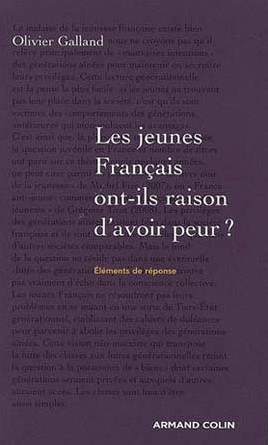 A youth "without a future"
A youth "without a future"
Do French young people have reasons to be afraid (1)? That's where the issue lies. Hardly ¼ of them confirm believing in the future: they're the most negative among European youngsters and one has to fly as far as Japan to find a gloomier youth. Unemployment and the difficulties of entering the work force are at the heart of this uneasiness. According to the INSEE , 23.8% of the 15 to 18 years-olds are jobless compared to 9.1% unemployed for the whole population (3rd trimester 2009). If the crisis did not help to arrange things, these discriminations are constant since the 1980's. They have led to an extension of the time needed to settle in a job, an "insertion" of about 3 years (2).
Think of the sacrosanct internships, now institutionalised that provide free labour and offer all kinds of tasks for private companies and public institutions. Being the first victims of "flexibility", young people occupy the most insecure jobs (temporary work).
Studies and diplomas do not protect from unemployment anymore. Claire, 26 years old, political sciences graduate, bilingual, passed the regional attaché examination and will take more than 10 months, after several internships, to find a job. She remembers "a period of dreadful anxiety". "Especially when you believe that your CV is a good one". That's where we tackle the very French question of declassification due to social democratisation. Nonetheless, those who have fewer diplomas are the ones to find it more difficult.
French tertiary education or the egalitarian fiction
Highly criticised, the democratisation of tertiary education is currently at the heart of debates. People accuse its "decreased level" and consider it as inadequate. And even if inequalities still persist, on the long term, it has benefited children coming from families with modest incomes in terms of employment and salary (D.Cohen, Une jeunesse difficile - A difficult youth).
The number of students has doubled in 30 years to reach a total of 2.2 million in 2009, that is half of a generation. The proportion of Advanced level certificate holders has increased from 29 to 63% between 1985 and 1995. However, French tertiary education relies on - and this is its singularity - putting very different fields of study and different types of establishment especially universities and "grandes écoles", in competition with each other. This duality enables the country to conserve the egalitarian fiction of a meritocratic ideal (university is open to all and affordable) while in reality it practices a pitiless selective policy.
According to Galland, the French youth's uneasiness results most probably from a crisis of this "meritocratic" model and is therefore not really related to their "objective" economic condition. This is an inefficient and unjust model that subjects them to "academic pressure", dreading failure and obsessed by diplomas at the same time. This is what often makes university studies a disappointing experience in which they're not interested anymore.
Nonetheless, this doesn't prevent the existence of a "university life" shared by several young people today. It is characterized by "nights out" with friends that youngsters find essential.
A long transition period
The INSEE has extended youth's age group to 30 years, instead of 25. Youth has thus been extended. Previously, the passage to adult life used to happen in a very abrupt way through simultaneous "threshold" crossings: marriage, employment, house. Nowadays, the transition is more spread over time. Being more and more dependant, young people settle down later in life but they leave home earlier - very often right after having finished high school. ¾ of the students are obliged to work. The passage to autonomy has become "progressive" for everyone.
Flat sharing has developed considerably; same thing for out of wedlock cohabitation concerning 1 couple out of 8, against 1 out of 35 in 1968. In fact, it's the principal way of starting a couple's life (9/10). Young people's relation to marriage has also changed: it has become a choice and is not a social obligation anymore. Young people get married later on in life, at the age of 30. The number of PACS (pacte civile de solidarité - civil partnership) has increased (+77000 in 2006), and concerns ¼ of unions. The dissolution of marriage is also increasing.
Succeeding one's personal life has become essential. This is obtained by "a gradual identity construction".
Disengaged French youth?
A distance taken from politics accompanies this turning in on individual life. Nearly 2/3 of the 15 to 25 year old age group do not trust our leaders. They usually belong to no party, because "they don't identify themselves to it" and have difficulties to situate themselves on the political spectrum even though the majority (36%) feels rather left that right (13%). They do not believe in the voting power and are often abstainers, even if they consider the vote as the pillar of democracy.
However, taking distance does not mean becoming indifferent. Our youth is a protesting one. Strikes and "protests" are founding moments. They are usually organised to react to educational reforms or political events. When compared to "traditional" commitment, these protests are brief and occasional.
Young people have also dedicated themselves to civil society organisations, of which they give a very positive image: 85% believe these organisations can change things - the rate falls down to 40% when it comes to politicians. This is maybe a sign of the importance young people give to concrete local actions. However the concept of "civil society" is quite vast: it involves sports clubs as much as humanitarian NGO's or organisations offering tutoring organisations. Individual wellbeing and friendship are privileged over altruism and solidarity.
In fact, sociological studies point out the individualism that reigns among French young people.
Between autonomy and individualism
More precisely, they highlight a particular balance: on the one hand, a weak sense of belonging to the community and on the other hand a big moral openness among all - it's the bond between individualism and autonomy. With regards to lifestyle habits, young French people are more open than their parents but they claim more regulations. Their relation to order has changed. Contestation has nothing revolutionary or festive anymore. One of our youth's traits could well be its' seriousness, its resignation. Young people have a sense of responsibility.
This kind of contradiction clearly comes out in their relation to alcohol. "Drink or drive, you have to choose": the majority of youngsters do not drive after drinking and refuse to take the car with a drunk driver. Nonetheless, 44.4% of those aged between 20 and 25 years (Health Barometer 2000) "get pissed", "get boozed up" every weekend. And they all state that they drink "to chill out" because "we have a lot of pressure", "we are too stressed"... If each and everyone consider alcohol as a (as THE) way to party, this shows there's a deep collective uneasiness.
"Youth is just a word": a common culture?
Can we speak of "a" youth, of "a'' culture, of a generation's common experience? The question has been widely debated by sociologists since the 1960's. The difference between young men and young women is well known: in spite of a certain homogenisation, the salaries of the latter remain weaker. Racial discrimination is also at the heart of debates. One thing is sure: French young people are cross-cultural and there lies one of its advantages. In spite of the tensions, vigorously kindled by current policies, young people have understood it: on average, they are more tolerant than their elders. Nevertheless, the education and professional situation remains very difficult for the famous "youngsters coming from immigration backgrounds".
Moreover, they accumulate sociological and geographical disadvantages. The young people coming from underprivileged suburbs have inspired several studies, particularly in the aftermath of the 2005 riots. Objects of all fantasies, they are frequently at the front of the media and the political scene where they are often reduced to the figure of the little unemployed "rascal" who hangs around staircases and steals car radios forgetting about the young workers, activists, teachers...
Then there are the youngsters in the countryside or in other small cities of whom we talk so little. "Young culture" is always described as an urban model: university life, outings, culture, Internet use and openness to the world... Coming from working class backgrounds, they usually do not pursue their studies and find it very hard to find a job. They stay in their village and rarely travel. In their case, talking of an Internet generation does not make sense. Their situation is little known and surely not much taken into consideration. And yet they are also part of those 11.6 million young people aged between 15 and 29 worried about their future and the future of their society.
-
(1) Book by Olivier Galland published in April 2009.
(2) "Génération 98", survey conducted between 1998 and 2005.
(3) Les jeunes en France (Young people in France), directed by Bernard Roudet, 2009. A collective work that gives an overview of youth related issues.
www.injep.fr/







